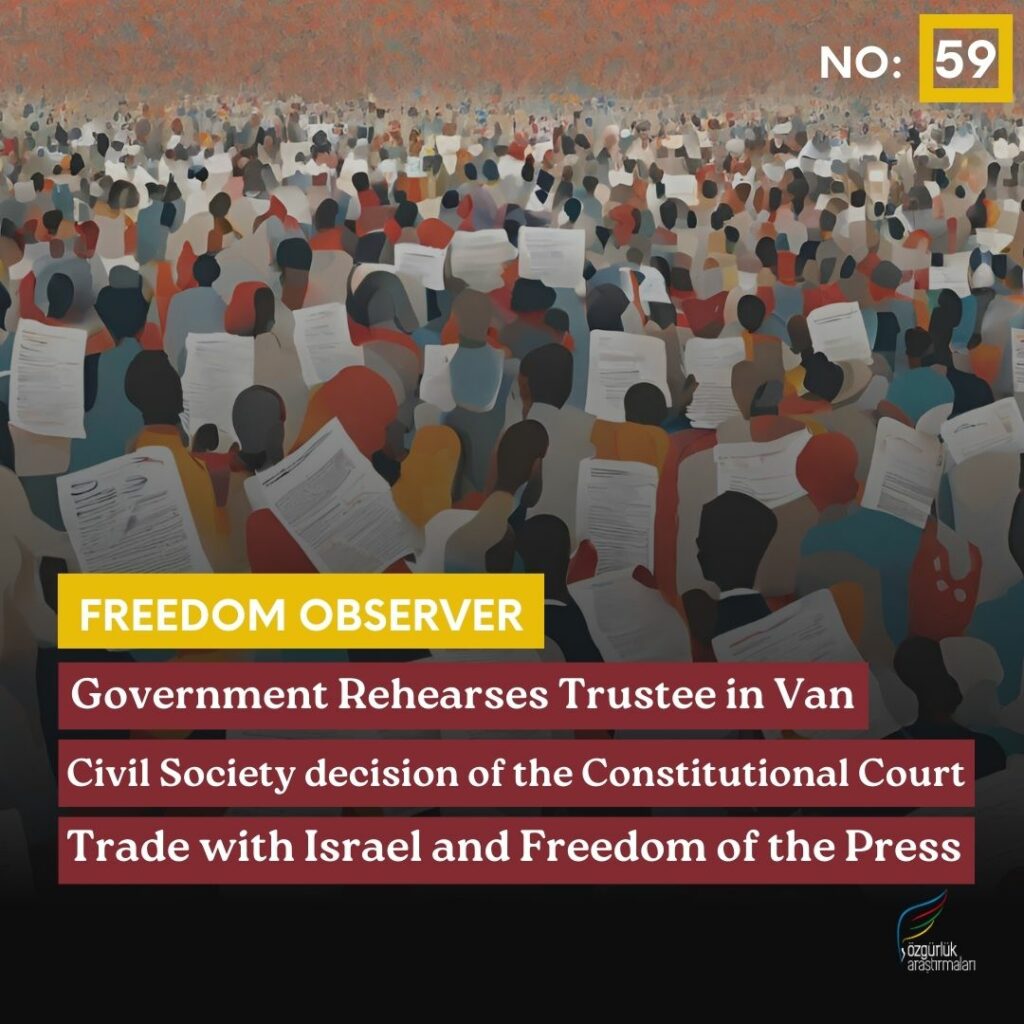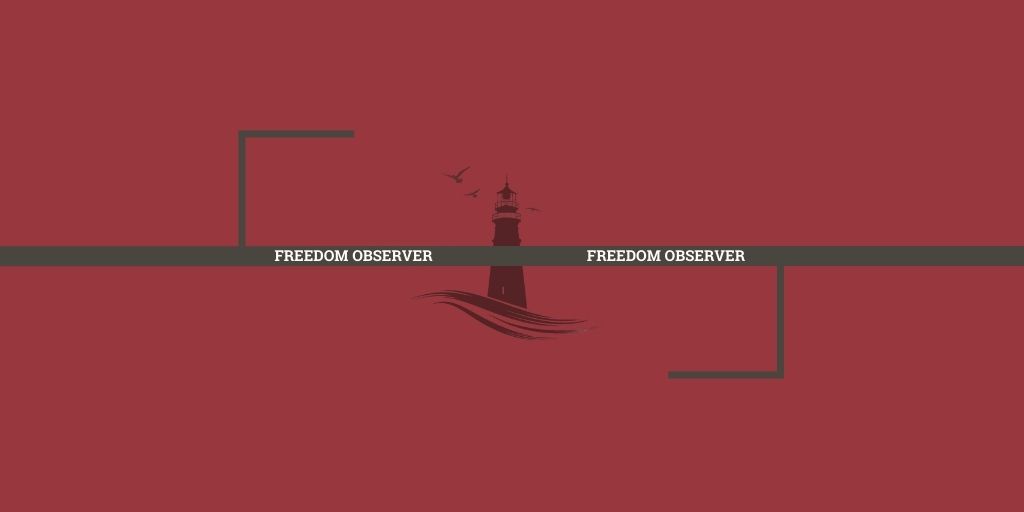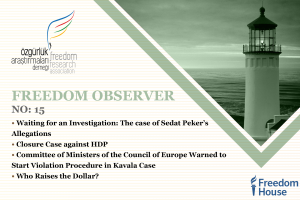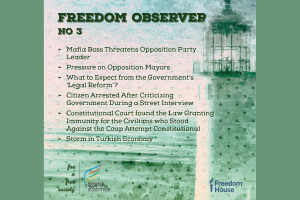
From Editor – in- Chef
Due to the particular circumstances created by the local elections on March 31 and the long Eid holiday, we had to take a long break from the Freedom Observer.
The 2024 local government elections, which had been campaigned for months, were finally held on March 31, with a surprising outcome. First of all, the Republican People’s Party, the largest opposition party in terms of votes in the mayoral elections, came first in the country with nearly 38% of the vote, while the Justice and Development Party, the first partner in the government and the first party for 22 years, came second with 35.5% of the vote.
The second surprising result of the elections was the rise of the Welfare Party to third place with a total of 6% of the vote. The DEM Party and MHP, the prominent parties on the left and right, respectively, saw a decline in their votes, falling to around 5%. The IYI Party, known for its ambitious leadership, dropped to 6th place with 3% of the vote and suffered significant losses. Meanwhile, the Felicity Party, Future Party, and DEVA Party failed to make substantial gains.
Another contributing factor is the decrease in voter turnout by approximately 5%, indicating that a significant portion of non-participating voters were traditional AKP supporters. (Some former AKP voters may have reverted to voting for the Welfare Party in this election.) Additionally, it can be inferred that approximately half of the 800,000 new voters who reached voting age since the May 2023 elections cast their votes in favor of the CHP.
It should be noted that the CHP’s success in the local elections does not guarantee victory in the presidential and parliamentary polls typically scheduled for 2028. Many factors could influence the party dynamics over the next four years. At present, the following observations can be made: If the new chairman continues the ‘Turkey Alliance,’ which is a partial extension of the ‘People’s Alliance’ and the policy of openness initiated by former chairman Kılıçdaroğlu, and supports it with a libertarian-democratic agenda, along with the contribution of the 2 million new voters who will come of age by then, the CHP could go very close to assuming power in both the legislative and executive branches in 2028. Specifically, if the CHP aims to lead the central administration, it appears that this strategy may be its only viable option.
Meanwhile, the election results, which dealt a significant blow to his party, appear to have prompted MHP leader Devlet Bahçeli to make new statements reminiscent of his typical style. Following the elections and on the eve of Eid, Bahçeli reacted to CHP leader Özel’s statement that “we have broken the glass ceiling” in reference to their success in the local elections by saying, “Those who claim to have broken the glass ceiling will never be given the opportunity to undermine the foundations of the Turkish state and the existence of the Turkish nation. The Republic of Turkey was not established through ballot boxes. Turkish history was not written in ballot boxes. Everyone needs to come to their senses and remember that sowing the wind will only bring about the whirlwind.” In the same speech, Bahçeli also commented on the granting of the mayoral position to the DEM Party candidate in Van, stating, “To argue that this decision is in line with the will of the nation is folly and deceit. The resolute will of the Turkish nation stands firmly against all forms of separatism, division, terrorism, and terrorists.”
While it may be somewhat expected for Bahçeli and his party to accuse the DEM Party of separatism and terrorism due to its known ideological stance, it is entirely unacceptable for Bahçeli to use the same harsh rhetoric against the CHP. His leader’s characterization of even the main opposition party’s aspirations for power based on electoral success as a threat to the state and the nation and his dismissal of its calls for democratic reforms within the established order as an affront to democracy, as evidenced by statements such as ‘the Republic was not founded at the ballot box,’ which reflects a fear of democracy, is reprehensible. If I were in favor of dissolving political parties, I would argue that the MHP should be dissolved by the Constitutional Court immediately due to its undemocratic objectives and actions!
Furthermore, one would expect the ruling parties to demonstrate democratic maturity and respect for the election results despite their defeat, based on their speeches and statements immediately following the elections. However, this was not the case in reality. In addition to the anti-democratic response from the MHP’s leader, as previously mentioned, the AKP also attempted to usurp control of the metropolitan municipality in Van through alternative means. Essentially, they sought to appoint a ‘trustee’ to the mayoralty of Van, but fortunately, this attempt was temporarily thwarted by the Supreme Electoral Council. More details on this issue can be found in A. Rıza Çoban’s article below. Ö. Faruk Şen also delves into the impact of the debate on trade with Israel on the elections and its implications for freedom of expression.
“Meanwhile, while the process for the election of the new ‘First President’ of the Court of Cassation, which has become a drawn-out saga, continues with little hope of resolution, the transition of the presidency of the Constitutional Court occurred without any issues. As previously reported, an election was held to fill the vacancy left by Zühtü Arslan, who had resigned from the Constitutional Court and Kadir Özkaya was elected as the new President of the Court. Following the farewell ceremony for former President Zühtü Arslan on April 20, he officially stepped down from his position as a member of the Constitutional Court.
However, the prolonged delay in the election of the President of the Court of Cassation has evolved into what appears to be a ‘judicial’ crisis. Unfortunately, behind this apparent judicial crisis lies a political crisis, with the AKP and the MHP appearing as the main actors. In the current political climate dominated by the AKP and the MHP, crises originating from the Court of Cassation can quickly escalate into political crises, as evidenced by recent unfortunate developments in the Osman Kavala case. Thus, while regrettable, we are not entirely surprised by these events.
Looking forward to the next Freedom Observer!
* Prof. Dr. Mustafa Erdoğan
Government Rehearses Trustee in Van
On April 2, 2024, amid the ongoing discussions regarding the political implications of the CHP’s historic success in the March 31 local elections and the AKP’s unprecedented position as the second party for the first time in its history, the Van Provincial Election Board made a controversial decision regarding the Van Metropolitan Municipality election. Despite Abdullah Zeydan, the candidate of the Peoples’ Equality and Democracy Party (DEM Party), winning 55.48% of the votes, the board declared him ineligible for office. Instead, they announced that the mazbat (certificate of election) would be awarded to Abdulahat Arvas, the AKP candidate who secured 27.15% of the votes. The reason cited for this decision, which sparked outrage across the country, was the annulment of the Court’s ruling on the restoration of Abdullah Zeydan’s civil rights. In March 2023, Zeydan petitioned the Diyarbakır 5th High Criminal Court for the reinstatement of his rights, and the Court ruled in his favor on April 4, 2023. As no appeals were lodged against this decision, it became final, with the annotation of finalization recorded in the Court’s decision. Zeydan’s candidacy was based on this finalized decision, which had been approved by the competent authorities.
However, two days prior to the election, at the close of business hours, the Ministry of Justice lodged an objection, asserting that the decision had not been communicated to the Chief Public Prosecutor’s Office. Subsequently, on March 29, 2024, the Diyarbakır 5th High Criminal Court rendered a verdict to annul the ruling on the restoration of rights. The elections proceeded without public knowledge of this decision, and Zeydan emerged victorious with a significant margin of victory.
Based on the decision of the Diyarbakır 5th High Criminal Court, the AKP candidate lodged an appeal with the Provincial Electoral Board, which subsequently issued the controversial decision. Legal experts argue unanimously that the Diyarbakır 5th High Criminal Court’s decision to revoke its earlier ruling on the restoration of rights lacks legal basis and is therefore null and void. No court has the authority to annul or amend its decision on the grounds of its own error after dismissing the case. Only through recourse to the appropriate legal remedies can a decision be annulled or reversed by the competent authorities. Furthermore, it later became apparent that the claim that the decision of the Diyarbakır 5th High Criminal Court was not communicated to the Chief Public Prosecutor’s Office was unfounded. The decision was uploaded to UYAP (National Judiciary Informatics System), and, more significantly, the Chief Public Prosecutor’s Office issued documentation regarding this decision.
There have been widespread reactions from the public, civil society, and political parties, particularly from some AKP officials, in response to the decision of the Van Provincial Election Board. Street demonstrations have erupted in numerous locations, notably in Van. The internal turmoil within the ruling party underscores the government’s lack of clear direction following the March 31st election results. Despite the harsh stance of certain bureaucrats associated with the palace circle, who perceive themselves as “state commissioners,” towards AKP members who criticized the decision of the Van Provincial Election Board, their influence did not, at least for the time being, sway the decision of the Supreme Electoral Council (YSK). The YSK unanimously decided to grant Zeydan the mazbat, or certificate of election.
In the rationale provided for the decision, it is asserted that the ruling of the Diyarbakır 5th High Criminal Court dated March 29, 2024, is deemed null and void. It is emphasized that on March 31, 2024, the date of the election, there existed a legally valid decision regarding the restoration of Abdullah Zeydan’s restricted rights, rendering him eligible for candidacy. The justification, spanning sixteen pages, outlines that the Ministry of Justice General Directorate of Judicial Registry and Statistics reviewed the decision of the Diyarbakır 5th High Criminal Court dated April 4, 2023, on August 10, 2023. It was determined that this decision had been issued less than three years after the completion of the sentence’s execution. Subsequently, the decision was forwarded to the Diyarbakır Chief Public Prosecutor’s Office for evaluation and enforcement of the legal requirement. However, no action was taken by the Chief Public Prosecutor’s Office in response to this matter.
With the decision of the Supreme Electoral Council (SBE), the acute crisis appears to have been temporarily resolved. However, it is noted in the SBE’s decision that the initial ruling on the restoration of restricted rights was deemed illegal. Consequently, there remains a possibility that the decision could be overturned through an extraordinary legal remedy. If this scenario unfolds, there is a chance that Zeydan’s mayoralty could once again be revoked. However, in such an event, since the mayor would be elected by the Metropolitan Municipality Assembly, a member of the assembly from the DEM party would likely be elected once more.
It is evident that the revocation of the mazbat, initiated by the Ministry of Justice, was an attempt to impose a trustee. However, the significant backlash from the public, civil society and political parties appears to have compelled the government to retreat, at least temporarily. This episode underscores the importance of consistently voicing solid objections from the public in every instance of attempting to impose arbitrary trustee practices that undermine democratic principles.
* Ali Rıza Çoban – Constitutional Lawyer
Constitutional Court Annuls Some Provisions of the Law Targeting Civil Society
The Constitutional Court has ruled that certain provisions of Law No. 7262 on the Prevention of Financing the Proliferation of Weapons of Mass Destruction are unconstitutional and must be annulled.[1] This law was purportedly enacted following Turkey’s placement on the gray list by the Financial Action Task Force (FATF) in an effort to comply with FATF recommendations and be removed from the list. However, the law did not include provisions aimed at preventing corruption and money laundering. Instead, it introduced a series of regulations that tightened controls on associations and imposed harsher sanctions, seemingly treating non-governmental organizations as if they were involved in financing terrorism.
In the annulment lawsuit filed by CHP deputies against this Law, which amended many laws, numerous provisions were claimed to be unconstitutional, and their annulment was demanded. The Constitutional Court decided to annul some of these provisions. Initially, the Court annulled the amendment to Law No. 7262, which stipulated that individuals, institutions, and organizations requested by the Audit and Cooperation Commission to provide information and documents cannot refuse to do so based on provisions in other laws. The Court found this provision lacking in assurances regarding the collection, processing, storage, and sharing of personal data, deeming it contrary to Articles 13 and 20 of the Constitution. However, the Court did not find unconstitutional the provision within the same article, which empowers the President of the Republic to determine the individuals, organizations, and means of maritime transportation to be added to the list prepared by the United Nations Security Council on the financing of terrorism. Notably, this provision does not include any principles or rules regarding this determination.
Secondly, several provisions amending Law No. 2860 on Aid Collection were annulled by the Constitutional Court. Among these, the provision stating that the criminal judgeship of peace must issue an access-blocking decision on unauthorized fundraisers on the internet within 24 hours was deemed contrary to Articles 13 and 26 of the Constitution. Additionally, the Court invalidated the provision specifying that the principles and rules regarding domestic and foreign aid should be regulated by a regulation, as it was found to be contrary to Article 7 of the Constitution. Furthermore, the provision mandating that all types of information and documents be requested by supervisory bodies during the monitoring of aid collection activities was deemed contrary to Articles 13 and 20 of the Constitution and was consequently annulled. Lastly, the provision specifying the confiscation of goods and money collected without authorization and the transfer of their ownership to the public was annulled on the grounds that it violates the principle of proportionality. This is because the provision dictates that the property of goods and money collected without authorization be transferred to the public instead of being returned to the donors.
Thirdly, certain amendments to Law No. 5253 on Associations were annulled by the Constitutional Court. In this regard, the Court invalidated the provision authorizing the Ministry of Interior and local administrative authorities to issue instructions to other ministries and institutions. This decision was based on the absence of hierarchy among ministries, which was deemed contrary to Article 123 of the Constitution. Additionally, the provision stipulates that individuals serving in an organ of the association other than the general assembly or relevant personnel could be suspended from duty by the Minister of Interior as a temporary measure in the event that prosecution is initiated against them for certain crimes within the scope of their association activities was annulled. The Court found this provision disproportionate.
The Constitutional Court stated that the measure caused a disproportionate restriction on the freedom of association for several reasons. Firstly, the duration of the measure was unclear. Secondly, it stipulated that if a prosecution was initiated against a person in charge of the association’s organs, the organ itself could also be suspended from office. Lastly, it did not allow for a re-evaluation according to the outcome of the criminal case. Similarly, the Court annulled the provision regarding the appointment of a trustee by a court decision in case of the suspension of individuals who are subject to criminal proceedings, deeming it contrary to the freedom of association.
Additionally, the Court invalidated the provision allowing associations to be fined up to 50 million Turkish Liras in the event of prosecution for crimes committed in favor of legal entities. This was found to be contrary to the presumption of innocence. However, the Court did not find the provision requiring associations to undergo annual audits unconstitutional, despite it being perceived as a significant tool of pressure on opposition associations.
Finally, the Constitutional Court annulled the amendment to Law No. 5549 on the Prevention of Laundering Proceeds of Crime, which obligated lawyers to share professional secrets and information obtained during their practice, including the notification of suspicious transactions, with the administration. The Court found this amendment to violate the confidentiality between lawyers and their clients and to impose a disproportionate burden on lawyers, contrary to Articles 13 and 20 of the Constitution.
Despite the annulment of certain provisions that exerted pressure on civil society organizations, associations continue to face pressure through the requirement for annual audits.
* Ali Rıza Çoban – Constitutional Lawyer
Trade with Israel and Freedom of the Press
In the March 31 local elections, one of the issues that exerted pressure on the government was its trade relations with Israel. Political parties, particularly the Yeniden Refah Party, propagated that military equipment and supplies were being sold to Israel, alleging that the government was contributing to a conflict in which Israel had caused the deaths of tens of thousands of civilians. It can be argued that this propaganda resonated with the AKP’s base and served as one of the factors dissuading AKP supporters from participating in the polls. Additionally, on the day preceding the election, an individual was detained for displaying a banner reading “Stop trade with Israel” at Erdoğan’s Sultanbeyli rally.[2] Furthermore, Trade Minister Ömer Bolat asserted before the election that those raising this issue were supported by the Mossad, stating: “The persistent efforts to implicate the government in accusations of trading with Israel, among other things, are orchestrated by certain fringe political elements and the terrorist organizations you mentioned, aimed at undermining and discrediting the government through fake accounts… This is particularly bolstered by Israeli intelligence.”
After journalist Metin Cihan shared data obtained from open sources, the debate intensified further.[3] In his Eid message, Erdoğan reiterated his commitment to standing with the people of Gaza and called on those spreading falsehoods against their own state to use reason and conscience.[4] The Center for Combating Disinformation under the Communications Directorate also asserted that the purported sale of jet fuel involved “only jet fuel purchased for Israeli civilian aircraft at airports within Turkish territory.” [5] However, sometime later, the Ministry of Trade announced its decision to impose export restrictions on Israel. The restricted products include construction materials, chemical products, steel and aluminum products, and various others, including aviation fuel and jet fuel, which were previously allowed for trade.[6]
The debate on this issue did not conclude naturally with the imposition of trade restrictions. A dispute arose between journalist Metin Cihan and former Industry and Technology Minister Mustafa Varank. Cihan shared photos with the public showing Varank visiting a company that exports shotgun spare parts and components to Israel.[7] In response, Varank stated that he had visited numerous factories of this nature during his tenure as Industry Minister and accused Cihan of being “an immoral, deceitful informant who lacks the courage to reside in Turkey.”[8]
The AKP government has attempted to conceal the issue of trade with Israel from the public, employing tactics similar to those used for various other contentious issues. Journalists and politicians who brought attention to this matter were marginalized and accused of being agents of foreign powers. However, the information eventually surfaced publicly, likely exacerbated by the AKP’s defeat in the local elections, prompting a backtrack on this issue.
In this context, the significance of freedom of the press should once again be underscored. Safeguarding press freedom is essential for ensuring governmental accountability. Journalists and independent media outlets play crucial roles in enlightening the public and holding governments accountable for their actions. As evidenced in this case, attempts to intimidate journalists through menacing remarks undermine democratic processes and hinder the public’s access to information. It must be emphasized that without a free and independent press, the public cannot be properly informed, and the healthy functioning of democracy is compromised.
* Ömer Faruk Şen – Ph.D. – Missouri University
AYM, E.2021/28, K.2024/11, 18/01/2024, karara şuradan erişilebilir: https://normkararlarbilgibankasi.anayasa.gov.tr/ND/2024/11
2 https://medyascope.tv/2024/03/30/erdoganin-sultanbeyli-mitinginde-israille-ticareti-kes-pankarti-actigi-icin-gozaltina-alinan-genc-konustu-ikiyuzlulugu-ifsa-ediyoruz-dualar-filistine-ama-cepl/
3 https://www.youtube.com/watch?v=sitfU42GXbI
4 https://www.sozcu.com.tr/erdogan-dan-israil-le-ticaret-elestirilerine-sert-yanit-p38591
5 https://www.politikyol.com/iletisim-baskanligindan-israile-jet-yakiti-yalanlamasi-turkiyedeki-havalimanlarinda-israile-ait-sivil-ucaklara-satilan-yakittir/
6https://twitter.com/ticaret/status/1777577177489305889?ref_src=twsrc%5Etfw%7Ctwcamp%5Etweetembed%7Ctwterm%5E1777577177489305889%7Ctwgr%5E6690d1712dbdfce9e6d7f08f98855fc0ec1d9887%7Ctwcon%5Es1_&ref_url=https%3A%2F%2Fwww.tr724.com%2Faciga-cikan-gercek-ve-akp-utanmazligi%2F
7 https://x.com/metcihan/status/1780477690400674130
8https://twitter.com/varank/status/1780493093445177499?ref_src=twsrc%5Etfw%7Ctwcamp%5Etweetembed%7Ctwterm%5E1780493093445177499%7Ctwgr%5Eabd9ee6e0dad3a78189e17bc67f120fd5fe27fa1%7Ctwcon%5Es1_&ref_url=https%3A%2F%2Ftr.euronews.com%2F2024%2F04%2F17%2Fgazeteci-metin-cihan-ve-eski-bakan-varank-arasinda-israile-silah-satisi-tartismasi





